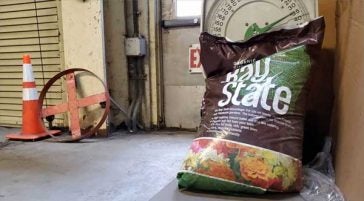
The MWRA plant receives sludge from Deer Island, which is then treated, centrifuged, and dried into fertilizer. For nearly thirty years, it has been sold by tens of thousands of tons each year to farms, golf courses, parks and gardens across the region. However, recent tests of the fertilizer pellets reveal high levels of toxic chemicals known as PFAS, which are linked to a broad range of diseases and health problems including kidney cancer and immune deficiencies. Results of testing showed that the fertilizer contained over 18,000 parts per trillion of three types of PFAS, but the overall amount is likely more, given the lack of testing for a comprehensive list of chemicals.
While the EPA currently recommends a standard maximum of 70 parts per trillion in drinking water of the two most common PFAS chemicals combined, there is no federal or state standard for allowable levels of PFAS in wastewater sludge. Federal and state regulators are currently reviewing standards due to the growing body of research that suggests significant toxicity of PFAS at much lower levels.
Risks associated with the contaminated sludge, also known as biosolids, used to make the fertilizer include its potential to leach into groundwater and be absorbed by plants or ingested by livestock. Laurel Schaider, a research scientist at the Silent Spring Institute notes that, “Applying biosolids with such high levels of PFAS to land risks contaminating drinking-water supplies and food crops.” These findings encourage a movement to improve testing protocols and screening levels of entities that sell, distribute, and apply biosolids to control the spread of PFAS and protect public health.

